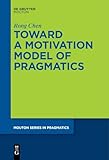Toward a Motivation Model of Pragmatics / Rong Chen.
Material type: TextSeries: Mouton Series in Pragmatics [MSP] ; 27Publisher: Berlin ; Boston : De Gruyter Mouton, [2022]Copyright date: ©2022Description: 1 online resource (XIII, 333 p.)Content type:
TextSeries: Mouton Series in Pragmatics [MSP] ; 27Publisher: Berlin ; Boston : De Gruyter Mouton, [2022]Copyright date: ©2022Description: 1 online resource (XIII, 333 p.)Content type: - 9783110787580
- 9783110787856
- 9783110787702
- 401.45 23
- P99.4.P72 C44 2022
- online - DeGruyter
- Issued also in print.
| Item type | Current library | Call number | URL | Status | Notes | Barcode | |
|---|---|---|---|---|---|---|---|
 eBook
eBook
|
Biblioteca "Angelicum" Pont. Univ. S.Tommaso d'Aquino Nuvola online | online - DeGruyter (Browse shelf(Opens below)) | Online access | Not for loan (Accesso limitato) | Accesso per gli utenti autorizzati / Access for authorized users | (dgr)9783110787702 |
Browsing Biblioteca "Angelicum" Pont. Univ. S.Tommaso d'Aquino shelves, Shelving location: Nuvola online Close shelf browser (Hides shelf browser)
Frontmatter -- Foreword -- Contents -- List of figures -- List of tables -- Chapter 1 Pragmatics then and now -- Chapter 2 A motivation model of pragmatics (MMP) -- Chapter 3 MMP and (im)politeness -- Chapter 4 MMP and cross-/intercultural variation -- Chapter 5 MMP and diachronic pragmatics -- Chapter 6 MMP and discourse -- Chapter 7 MMP and metaphor -- Chapter 8 MMP and the non-literal -- Afterword -- References -- Appendix -- Subject index -- Author index
restricted access online access with authorization star
http://purl.org/coar/access_right/c_16ec
With the “discursive turn” has come a distrust – a complete rejection by some – of theories that seek deeper reasons for surface phenomena. Rong Chen argues that this distrust, with its accompanying overemphasis on specificity and fluidity of linguistic meaning and social values, is unwarranted and unhelpful. Drawing on insights from social theories and various strands of pragmatics, he proposes a motivation model of pragmatics (MMP), contending that language use can be adequately, coherently, and elegantly studied via the motivation behind it in its varied and dynamic contexts. The model, with its well-laid out components, is then applied to (im)politeness research, cross-cultural pragmatics, diachronic pragmatics, discourse and genre analysis, conversation analysis, identity construction, and the study of metaphor, sarcasm, parody, and lying. MMP is thus a framework aimed at accounting for fluidity with stable notions, specificity with general principles, and differences with similar underlying factors. As such, the book should appeal to students of pragmatics, (im)politeness, conversation analysis, sociolinguistics, applied linguistics, communication, sociology, and psychology.
Issued also in print.
Mode of access: Internet via World Wide Web.
In English.
Description based on online resource; title from PDF title page (publisher's Web site, viewed 25. Jun 2024)









